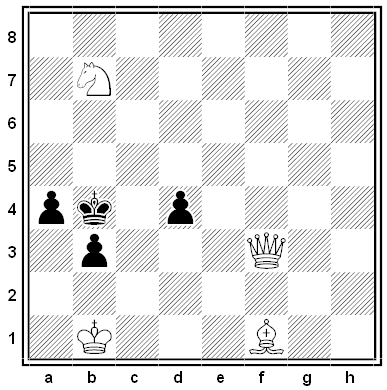The first 10 letters of the alphabet, ABCDEFGHIJ, form a cipher that conceals the name of a number less than 100. What is the number?
Fixing Dates
In 1899, British statistician Moses B. Cotsworth noted that recordkeeping could be greatly simplified if each month contained a uniform number of whole weeks. He proposed an “international fixed calendar” containing 13 months of 28 days each:
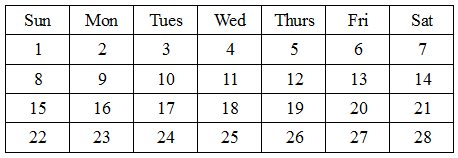
This makes everything easier. The 26th of every month falls reliably on a Thursday, for example, and statistical comparisons between months are made more accurate, as each month contains four tidy weeks with four weekends. (Unfortunately for the superstitious, every one of the 13 months contains a Friday the 13th.) A new month, called Sol, would be wedged between June and July, and an extra day, “Year Day,” would be added at the end of the year, but it would be independent of any month (as would Leap Day).
In 1922 the League of Nations chose Cotsworth’s plan as the most promising of 130 proposed calendar reforms, but the public, as always, resisted the unfamiliar, and by 1937 the International Fixed Calendar League had closed its doors. It left one curious legacy, though: George Eastman, the founder of Eastman Kodak, was so pleased with Cotsworth’s scheme that he adopted it as his company’s official calendar — and it remained so until 1989.
Unquote
“The thoughts that come often unsought, and, as it were, drop into the mind, are commonly the most valuable of any we have, and therefore should be secured, because they seldom return again.” — John Locke, letter to Samuel Bold, May 16, 1699
Parting Words
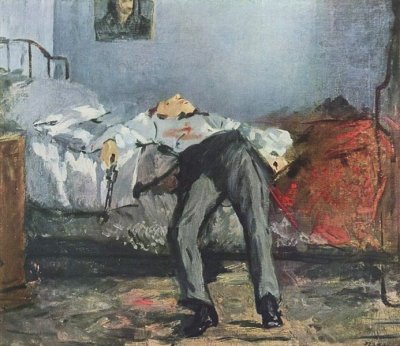
Dear Betty:
I hate you.
Love,
George
— Suicide note quoted in Marc Etkind, Or Not to Be: A Collection of Suicide Notes, 1997
From the agony I have been through for no reason whatever I can only come to the logical conclusion that if there is a god that he is not so good as is made out.
— A young clerk’s suicide note, quoted in Olive Anderson, Suicide in Victorian and Edwardian England, 1987
Kids, if there are any errors in this letter, I did not proof it carefully.
— From the 1985 suicide note of Cleveland superintendent of schools Frederick Holliday, who shot himself in a high school stairwell on learning that the school board planned to oust him
In 1930, San Quentin death row inmate William Kogut removed one of the hollow steel legs from his cot, stuffed it with red pips torn from from several packs of playing cards, and soaked them with water. Then he plugged one end of the pipe with a broom handle, rested it on a kerosene heater, and held the open end against his head. The red ink contained enough nitrocellulose to cause an explosion that drove the card fragments into Kogut’s head, killing him.
His note to the warden said that he was punishing himself for the murder of Mayme Guthrie. “Do not blame my death on any one because I fixed everything myself,” he wrote. “I never give up as long as I am living and have a chance, but this is the end.”
Groaners
- How does a deaf man indicate to a hardware clerk that he wants to buy a saw?
- How can you aim your car north on a straight road, drive for a hundred yards, and find yourself a hundred yards south of where you started?
- What runs fore to aft on one side of a ship and aft to fore on the other?
- A very fast train travels from City A to City B in an hour and a quarter. But the return trip, made under identical conditions, requires 75 minutes. Why?
- Does Canada have a 4th of July?
- Exhausted, you go to bed at 8 p.m., but you don’t want to miss an appointment at 10 a.m. the next day, so you set your alarm clock for 9. How many hours do you sleep?
Misc
- Babe Ruth struck out 1,330 times.
- EMBARGO spelled backward is O GRAB ME.
- The numbers on a roulette wheel add to 666.
- The fourth root of 2143/22 is nearly pi (3.14159265258).
- “A prosperous fool is a grievous burden.” — Aeschylus
Six countries have names that begin with the letter K, and each has a different vowel as the second letter: Kazakhstan, Kenya, Kiribati, Kosovo, Kuwait, Kyrgyzstan.
(Thanks, Danny.)
Dreamed Up
In composing a state map of New York in the 1930s, the General Drafting Company wanted to be sure that competing mapmakers would not simply copy its work. So the company’s founder, Otto G. Lindberg, and his assistant, Ernest Alpers, scrambled their initials and placed the fictional town of Agloe at the intersection of two dirt roads in the Catskills north of Roscoe.
Several years later, they discovered Agloe on a Rand McNally map and confronted their competitor. But Rand was innocent: It had got the name from the county government, which had taken it from the Agloe General Store, which now occupied the intersection. The store had taken the name from a map by Esso, which had (apparently) copied it from Lindberg’s map. Agloe had somehow clambered from imagination into reality.
Similarly, in 2001 editors placed a fake word in the New Oxford American Dictionary as a trap for other lexicographers who might steal their material. Fittingly, the word was esquivalience, “the willful avoidance of one’s official responsibilities; the shirking of duties.”
Sure enough, the word turned up at Dictionary.com (it’s since been taken down), citing Webster’s New Millennium Dictionary.
And as with Agloe, the invention has taken on a life of its own. NOAD editor Christine Lindberg, who coined esquivalience, told the Chicago Tribune that she finds herself using it regularly. “I especially like the critical, judgmental tone I can get out of it: ‘Those esquivalient little wretches.’ Sounds literate and nasty all in one breath. I like that.”
A Farewell

Book One of F. Scott Fitzgerald’s This Side of Paradise concludes with this italicized passage as Tom and Amory are taking leave of Princeton:
The last light fades and drifts across the land — the low, long land, the sunny land of spires; the ghosts of evening tune again their lyres and wander singing in a plaintive band down the long corridors of trees; pale fires echo the night from tower top to tower: Oh, sleep that dreams, and dream that never tires, press from the petals of the lotus flower something of this to keep, the essence of an hour.
No more to wait the twilight of the moon in this sequestered vale of star and spire, for one eternal morning of desire passes to time and earthy afternoon. Here, Heraclitus, did you find in fire and shifting things the prophecy you hurled down the dead years; this midnight my desire will see, shadowed among the embers, furled in flame, the splendor and the sadness of the world.
In fact this is a sonnet. Fitzgerald had written it originally in rhymed lines of iambic pentameter and decided only afterward to run it into prose. There’s a second such poem (“The February streets, wind-washed by night”) hidden in the section “Looking Backward.” See Prose Poetry.
Speaking of Princeton, I found this photo while researching art for this post — “Princeton students after a freshman vs. sophomores snowball fight in 1893”:
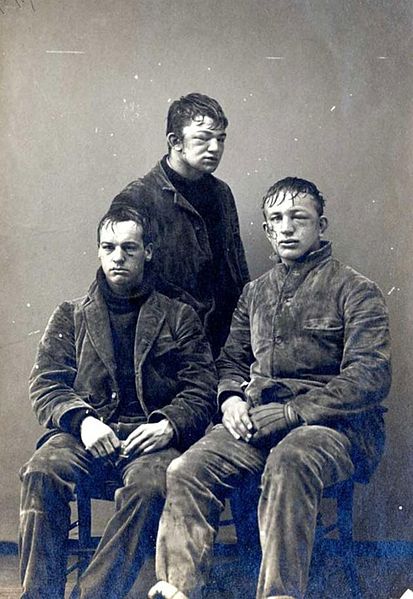
Advance and Retreat
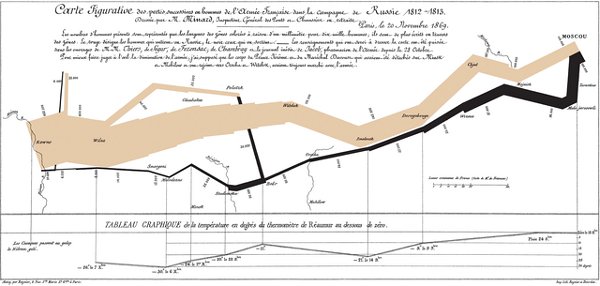
This chart, devised in 1869 by French civil engineer Charles Minard, illustrates the disastrous toll suffered by Napoleon’s army on its foray into Russia in 1812. Yale political scientist Edward Tufte describes it in his 1983 book The Visual Dislay of Quantitative Information:
Beginning at the left on the Polish-Russian border near the Niemen River, the thick band shows the size of the army (422,000 men) as it invaded Russia in June 1812. The width of the band indicates the size of the army at each place on the map. In September, the army reached Moscow, which was by then sacked and deserted, with 100,00 men. The path of Napoleon’s retreat from Moscow is depicted by the darker, lower band, which is linked to a temperature scale and dates at the bottom of the chart. It was a bitterly cold winter, and many froze on the march out of Russia. As the graphic shows, the crossing of the Berezina River was a disaster, and the army finally struggled back into Poland with only 10,000 men remaining. Also shown are the movements of auxiliary troops, as they sought to protect the rear and the flank of the advancing army. Minard’s graphic tells a rich, coherent story with its multivariate data, far more enlightening that just a single number bouncing along over time. Six variable are plotted: the size of the army, its location on a two-dimensional surface, direction of the army’s movement, and temperature on various dates during the retreat from Moscow.
He concludes, “It may well be the best statistical graphic ever drawn.”


